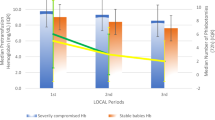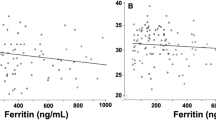Abstract
OBJECTIVES: Erythrocyte transfusions to neonates can be categorized as “early” if given during the first 3 weeks of life and “late” if given thereafter. We used a meta-analysis to determine whether recombinant erythropoietin (rEpo) administration to very-low-birth-weight (VLBW, <1500 g) neonates, beginning in the first week of life, reduces either “early” or “late” transfusions.
STUDY DESIGN AND METHODS: Studies that used a randomized, placebo-controlled, double-masked design were deemed acceptable. We identified 12 acceptable, relevant, clinical trials. Additional data not provided in the publications were obtained from two of the authors.
RESULTS: The acceptable studies involved an aggregate of 561 rEpo and 529 placebo recipients. If rEpo was begun in the first week of life, the summary odds ratio (OR) for receiving any transfusion (“early” or “late”) was 0.52, 95% confidence interval (CI): 0.34 to 0.79 (p=0.001). The OR for receiving an “early” transfusion was 0.54 (95% CI: 0.25 to 1.15; p=0.055), and the OR for receiving a “late” transfusion was 0.56 (95% CI: 0.37 to 0.83; p=0.036). Heterogeneity among studies was too great to estimate the effect of rEpo on the number of transfusions received or the volume of blood transfused (p<0.001 for the Q-test statistic). Subgroup analysis suggested that when rEpo is begun in the first week of life, neonates 1000 to 1500 g and >29 weeks are more likely to completely avoid transfusion than are extremely low-birth-weight (ELBW, <1000 g) neonates. No dose–response relationship was apparent between rEpo dose or iron dose and transfusion. No difference was apparent depending on whether the rEpo was given subcutaneously vs intravenously.
CONCLUSION: If rEpo is begun in the first week of life, a moderate reduction can be expected (p=0.001) in the proportion of VLBW neonates transfused. Reduction is less significant in “early” transfusion (p=0.055) than in “late” transfusion (p=0.036). Such treatment is not likely to eliminate transfusions among ELBW neonates completely.
This is a preview of subscription content, access via your institution
Access options
Subscribe to this journal
Receive 12 print issues and online access
$259.00 per year
only $21.58 per issue
Buy this article
- Purchase on Springer Link
- Instant access to full article PDF
Prices may be subject to local taxes which are calculated during checkout
Similar content being viewed by others
References
Vamvakas EC, Strauss RG . Meta-analysis of controlled clinical trials studying the efficacy of rHuEPO in reducing blood transfusions in the anemia of prematurity. Transfusion 2001;41:406–415.
Juul SE . Erythropoietin in the neonate. Curr Prob Pediatr 1999;29:133–149.
Strauss RG . Blood banking and transfusion issues in perinatal medicine. In: Christensen RD, editor. Hematologic Problems of the Neonate. Philadelphia, PA: WB Saunders Co.; 2000. p. 405–426.
Zipursky A . Erythropoietin therapy for premature infants: cost without benefit? Pediatr Res 2000;48:136.
Mulrow CD, Oxman AD, editors. Cochrane. Collaborative Handbook [updated 21 Oct 1996]. Available in the Cochrane Library [database on disk and CD-ROM]. The Cochrane Collaboration; issue 3. Oxford Updated software; Updated quarterly. Available from: BMJ Publishing Group, London 1996.
Emmerson A, Coles H, Stern C, Pearson T . Double-blind trial of recombinant human erythropoietin in preterm infants. Arch Dis Child 1993;68:291–296.
Soubasi V, Kremenopoulos G, Diamandi E, Tsantali C, Tsakiris D . In which neonates does early recombinant human erythropoietin treatment prevent anemia of prematurity? Results of a randomized, controlled study. Pediatr Res 1993;34:675–679.
Soubasi V, Kremenopoulos G, Diamanti E, Tsantali C, Sarafidis K, Tsakiris D . Follow-up of very low birth weight infants after erythropoietin treatment to prevent anemia of prematurity. J Pediatr 1995;127:291–297.
Ohls R, Osborne K, Christensen R . Efficacy and cost analysis of treating very low birth weight infants with erythropoietin during their first two weeks of life: a randomized, placebo-controlled trial. J Pediatr 1995;126:421–426.
Lauterbach R, Kachlik P, Pawlik D, Bajorek I . Recombinant human erythropoietin in the treatment of anemia of prematurity. Pediatr Pols 1995;9:739–744.
Ohls R, Harcum J, Schibler K, Christensen R . The effect of erythropoietin on the transfusion requirements of preterm infants weighing 750 grams or less: a randomized, double-blind, placebo-controlled study. J Pediatr 1997;131:661–665.
Lima-Roger V, Torres-Montes A, Espinosa S, et al. Efficacy of treating very low birth weight and critical ill neonates with erythropoietin in the first 72 h of age: a randomized, placebo-controlled trial. Sangre 1998;43:191–195.
Donato H, Vain N, Rendo P, et al. Effect of early versus late administration of human recombinant erythropoietin on transfusion requirements in premature infants: results of a randomized, placebo-controlled, multicenter trial. Pediatr 2000;105:1066–1072.
Ohls R, Ehrenkranz R, Wright L, et al. Effects of early erythropoietin therapy on the transfusion requirements of preterm infants below 1250 grams birth weight: A multicenter, randomized, controlled trial. Pediatrics 2001;108:934–942.
Obladen M, Maier R, Grauel E, et al. Efficacy and Safety of recombinant human erythropoietin to prevent anemia of prematurity. Contrib Nephrol 1991;8:314–326.
Maier R, Obladen M, Scigalla P, et al. The effect of epoetin beta (recombinant human erythropoietin) on the need for transfusion in very-low-birth-weight infants. N Engl J Med 1994;330:1173–1178.
Maier R, Obladen M, Muller-Hansen I, Kattner E, Merz U, Arlettaz R, et al. Early treatment with erythropoietin beta ameliorates anemia and reduces transfusion requirements in infants with birth weights below 1000 g. J Pediatr 2002;141:8–15.
De la Torre M, Gascon F, Zapatero M, Guzman J, Huertas D, Ruiz D Jaraba P . Prophylaxis of anemia of prematurity with erythropoietin. Case control study. An Esp Pediatr 2000;53:243–248.
Trenseteaux A, Egreteau L, Santerne B, Morville P . Recombinant human erythropoietin in preterm infants: evaluation of one year of experience. Arch Pediatr 1999;6:944–951.
Hays S, Guy B, Boulard M, et al. Transfusion malgréerythropoïetine recombinante: échec ou limite du traitement? Etude d'une cohorte annuelle de poids de naissance inférieur a 1500 g. Arch Pediatr 2001;8:355–360.
Klosowski S, Djebara A, Bachiri A, Haouari N, Thelliez P, Morisot C . Anémie du prématuré et traitement par erythropoïetine humaine recombinante (rHuEPO): Quel bénéfice? Arch Pediatr 2001;8:1399–1400.
Atasay B, Gunlemez A, Akar N, Arsan S . Does early erythropoietin therapy decrease transfusions in anemia of prematurity? Indian J Pediatr 2002;69:389–391.
Carnielli V, Montini G, Da Riol R, Dall' Amico R, Cantarutti F . Effect of high doses of human recombinant erythropoietin on the need for blood transfusions in preterm infants. J Pediatr 1992;121:98–102.
Yeo C, Choo S, Ho L . Effect of recombinant human erythropoietin on transfusion needs in preterm infants. J Paediatr Child Health 2001;37:352–358.
Maier R, Obladen M, Kattner E, et al. High-versus low-dose erythropoietin in extremely low birth weight infants. J Pediatr 1998;132:866–870.
Brown M, Keith III J . Comparison between two and five doses a week of recombinant human erythropoietin of anemia of prematurity: a randomized trial. Pediatrics 1999;104:210–215.
Serra M, Espallargues M . Metaanálisis de ensayos clínicos. Pharm Care Esp 2000;2:83–92.
Petitti D . Meta-Analysis, decision analysis, cost-effectiveness analysis: methods for quantitative synthesis in medicine. 2nd ed. New York Oxford: Oxford University Press; 2000: 75–118.
Meyer MP, Meyer JH, Commeford A, et al. Recombinant human erythropoietin in the treatment of the anemia of prematurity: results of a double blind, placebo-controlled study. Pediatrics 1994;93:918–923.
Lee DA, Slagel TA, Jackson TM, Evans CS . Reducing blood donor exposure in low birth weight infants by the use of older, unwashed packed red blood cells. J Pediatr 1995;126:280–286.
Strauss RG, Burmeister LF, Johnson K, Cress G, Cordle D . Feasibility and safety of AS-3 red blood cells for neonatal transfusions. J Pediatr 2000;136:215–219.
Ohls RK . The use of erythropoietin in neonates. Clin Perinatol 2000;27:681–696.
Bifano EM, Curran TR . Minimizing donor bloods exposure in the neonatal intensive care unit. Current trends and future prospects. Clin Perinatol 1995;22:657–669.
Lin JC, Strauss RG, Kulhavy JC, et al. Phlebotomy overdraw in the neonatal intensive care nursery. Pediatrics 2000;106:E19.
Author information
Authors and Affiliations
Rights and permissions
About this article
Cite this article
Kotto-Kome, A., Garcia, M., Calhoun, D. et al. Effect of Beginning Recombinant Erythropoietin Treatment Within the First Week of Life, Among Very-Low-Birth-Weight Neonates, on “Early” and “Late” Erythrocyte Transfusions: A Meta-Analysis. J Perinatol 24, 24–29 (2004). https://doi.org/10.1038/sj.jp.7211018
Published:
Issue Date:
DOI: https://doi.org/10.1038/sj.jp.7211018
This article is cited by
-
Comparison between one and three doses a week of recombinant erythropoietin in very low birth weight infants
Journal of Perinatology (2011)
-
Erythropoietin to Prevent Transfusions in Premature Infants
Journal of Perinatology (2005)



